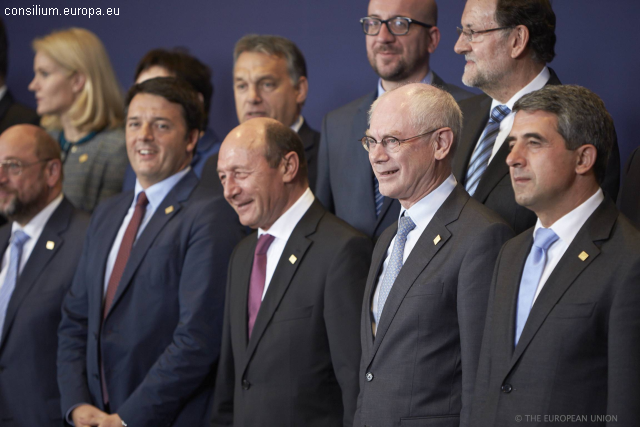European Summit in Brussels
The energy security and reducing pollution were discussed at the European summit in Brussels.

Bogdan Matei, 24.10.2014, 13:58
The leaders of the European Union Thursday reached what analysts have called “a historic agreement” on the reduction of greenhouse gas emissions by 40% compared to 1990, by 2030. According to the Radio Romania correspondent in Brussels, the deal will be binding across the Union and will involve contributions from Member States. The 28 heads of state and government have also agreed on two related targets: to increase the share of renewable energy to 27% of the total consumption, and to cut by 27% the overall energy consumption.
The incumbent president of the European Council, Herman Van Rompuy, has expressed his satisfaction with this achievement coming at the end of his term in office. “It was not easy, not at all, but we managed to reach a fair decision that sets the EU on an ambitious but cost-effective climate path,” he told a press conference in Brussels. Van Rompuy also said this was the most ambitious environment and energy policy target in the world.
In turn, the UN Secretary General Ban Ki-moon hailed the EU decision to cut its greenhouse gas emissions. In a news release issued by the UN, the official says the decision proves the EU’s continuing global leadership in taking bold action to fight climate change. The UN Secretary General also says that Europe has proved that managing the global climate needs is in its own best interest, in the long run. Environment watchdogs on the other hand argue that the measures agreed on in Brussels are modest and they actually slow down the production of clean energy.
Also on Thursday, the European Council approved new measures to reduce the Union’s energy dependence and to improve its energy security, both in terms of natural gas and of electricity. According to official news releases, the EU leaders decided that the Union’s foreign policy instruments must be used in order to convey consistent energy security messages, particularly to strategic partners and major suppliers. With the ongoing crisis in Ukraine and the problems in the Middle East, it has become clear that reducing Europe’s energy dependence is urgent and vital, Van Rompuy explained after the negotiations. This statement indicates the widespread concerns of the EU Member States regarding this coming winter, when Russia, an unpredictable supplier, may once again use its energy resources as an instrument to achieve its geopolitical goals.






























